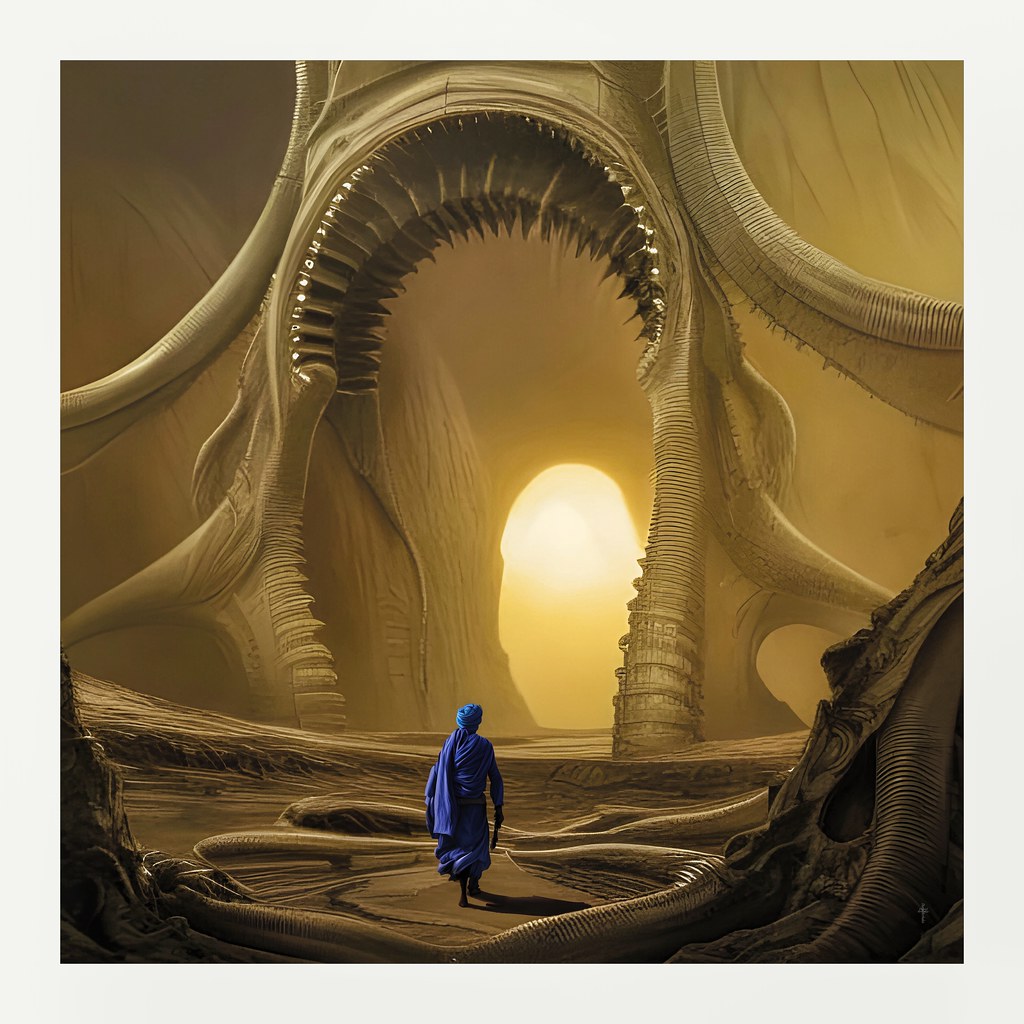#Tuareg cross
Text
Jeff's Tuareg Cross

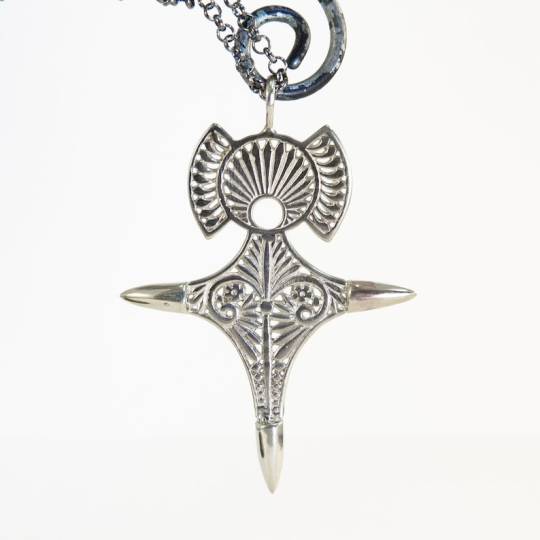
For sale on Etsy
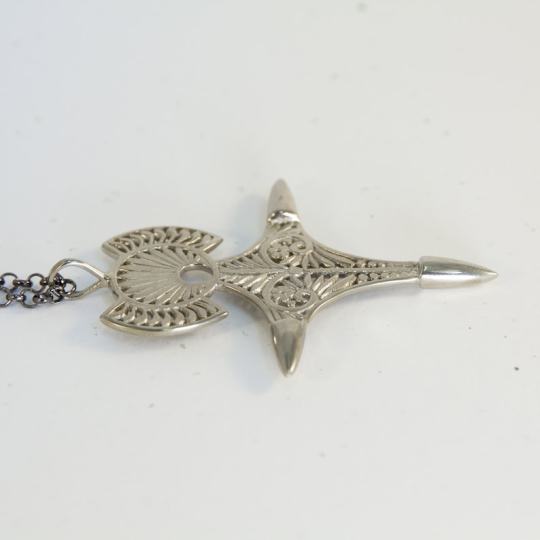
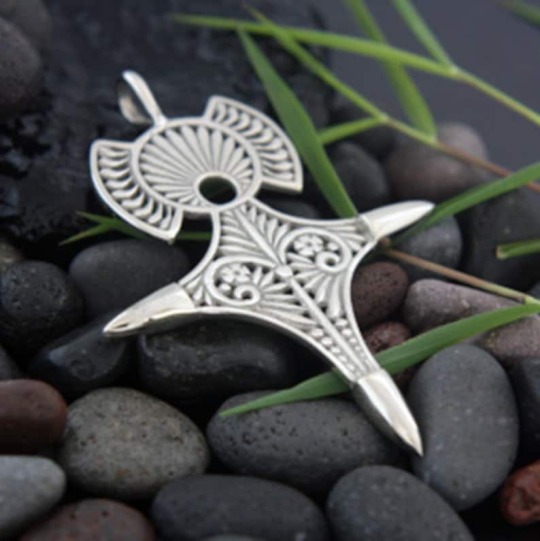
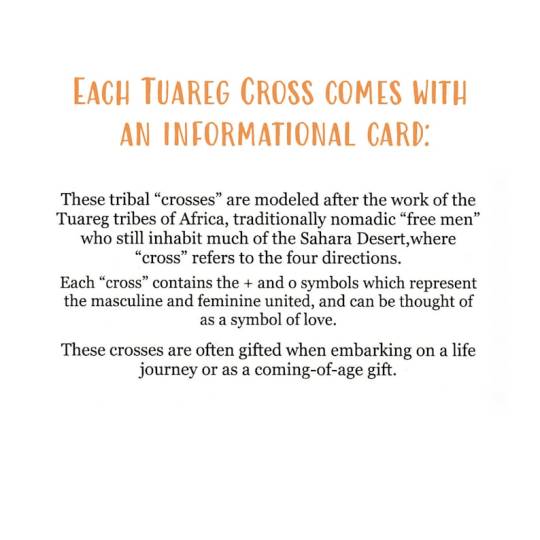
The Meaning
Any question about their symbolism put to the users generally elicits only vague answers. Some attribute to it a function of "grigri" or “reserve of wealth". The ethnologists Germaine Dieterlen and Ziedonis Ligers spotted a situation where the father gave the jewel to his son in age of virility, marriage and nomadism, saying to him: "My son, I give you the four directions of the world, because we do not know where you will go to die".[6]
According to one Tuareg elder narration, a young nomadic warrior wanted to declare his love to the young girl of his heart, the latter being locked up at home and therefore inaccessible to his messages. The village blacksmith then had a very important place in Tuareg society. As such, the blacksmith had the right to enter the houses of all the families with whom he traded with. The young man then had a jewel forged which combines the two syllables of the Tamashek word " T (a) R (a)" ("tara" meaning " love" and spelled "ⵜⵔ" in the Tifinagh alphabet.) and entrusted the blacksmith with the mission of transmitting the message of love to his beloved in the greatest discretion.[7]
#jeff buckley#jeffbuckley#Tuareg#Tuareg cross#agadez cross#love cross#four directions of the world#nomad#nomadic
21 notes
·
View notes
Text
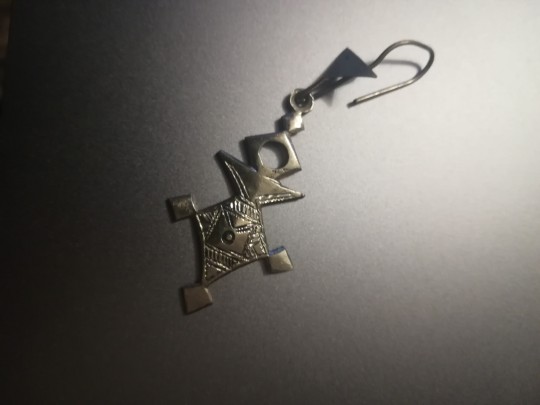
Does anyone know what this cross means? Maybe it s just decorative
2 notes
·
View notes
Text

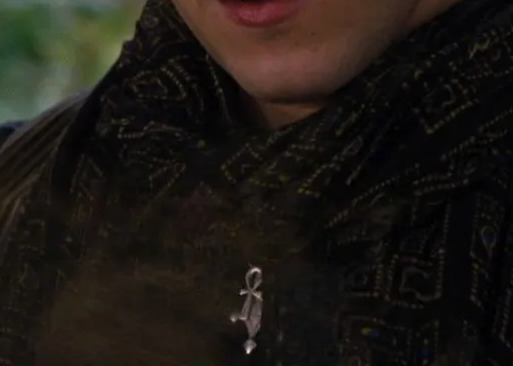
For those who missed it this morning, we solved the mystery of what was on Benjamin's necklaces. We've long known about the ankh (an ancient Egyptian symbol meaning life or eternal life), but we've discovered the other pendant is an Agadez Cross, a type of Saharan Berber jewelry made especially by the Tuareg people of Niger. They vary in design but the above example is nearly a perfect match for Benjamin's.
76 notes
·
View notes
Text
Occupying an interstitial position between different continents [...], [t]his position as a space-between-spaces makes the Maghrib a hub [...]. [I]nvestigate the location of the Maghrib beyond the dominant binary of Arab vs. Francophone, the much-critiqued idea of the Sahara as a barrier, or the assumption of the Maghrib as an insular space. [...] [T]he Maghrib was a revolutionary concept [...]. [T]he idea of the Maghrib was rooted in anticolonial thought, one which the machinations of colonial power and exigencies of postcolonial state building and border disagreements have stalled ever since. [...]
Tamazgha -- as indigenous Amazigh activists have chosen to call North Africa since the 1990s -- was populated by Amazigh populations of Christian and Jewish faiths. [...] These dynamics, however, neither eliminated Amazigh language and culture nor drove out the sizable Jewish populations that shared this Judeo-Islamic space. Rather, it was nineteenth- and twentieth-century European colonialism [...]. Governments have either entirely silenced Amazigh language and culture, as was the case in Libya and Tunisia, or actively repressed them, as was the case in Algeria and Morocco.
Nevertheless, a vibrant Amazigh Cultural Movement (ACM) has struggled to re-Amazighize the Maghrib by inventing traditions and refiguring toponymies.
---
Tamazgha, which this ACM defines as extending from the Siwa Oasis in Egypt to the Canary Islands in the Atlantic Ocean, has replaced both “North Africa” and “the Maghrib” in activist nomenclature.
Activists have thus reinscribed this consciousness of “al-dath al-amazighiyya” (the Amazigh self/subjectivity) in public spaces as well as in the markers of Maghribi geographies.
Gone are the days when Amazigh people could be simply erased from the cartography of their native lands. Tamazight has acquired a constitutional status in Morocco and an official one in Algeria. Its speakers are working to have it recognized in Libya and Tunisia. [...]
The ubiquity of the Tifinagh alphabet (the Tamazight script) and the proliferation of Tamazight literary and audiovisual production has created a new cultural reality. Across short stories, novels, film, and music, Amazigh creators are reinventing the Maghrib and reconciling it with its indigenous past. [...]
---
The rise of taskla Tamazight (Amazigh literature) and cultural production is the single most transformative literary development in the last thirty years of the Tamazghan intellectual movement. [...] Amazigh cultural producers are not just rehabilitating their mother tongue. They also rehabilitate an erased geography, a sense of indigeneity, and the relation-ship between space and people.
Shamal Iiriqiyya (North Africa in Arabic), Afrique du Nord (North Africa in French), or the Maghrib, are geographical and political appellations superimposed on the region [...]. Alternatively, Tamazgha is a politically conscious name that is from the same root as Tamazight.
Tamazgha means the land of the indigenous Imazighen, which reconfigures space, revisits history, and questions accepted toponymies. [...]
---
The plurality of the Maghrib and its multilingualism will undoubtably acquire a different meaning when we read them from the perspective of indigenous authors in Amazigh languages. Immersion in the discourses of the ACM reveals [...] foundational ideas like le Maghrib pluriel (the plural Maghrib) [...]. These organizations seeded and then advocated the idea of “al-wahda fi al-tannawwu‘” (unity in diversity). [...]
Whether it is Algerian Kabyle musician Idir, the Moroccan band Izenzaren (Sun Rays), or Malian Tuareg band Tinariwin (Deserts), Amazigh melodies and poetry travel, cross boundaries, and reconnect Imazighen across the globe.
This “traveling Tamazgha” complicates the Maghrib’s location and invites a constant mapping and remapping of the space and its aesthetics.
---
Text by: Brahim El Guabli. ”Where is the Maghreb? Theorizing a Liminal Space.” Arab Studies Journal Vol. XXIX, No. 2. Fall 2021. [Bold emphasis and some paragraph breaks/contractions added by me.]
33 notes
·
View notes
Text
The explorer Alexander Gordon Laing was murdered on September 26th 1826 in Edinburgh.
While some Scottish explorers' exploits are engraved on the national psyche, such as David Livingstone and Mungo Park, others like Alexander Gordon Laing have long since slipped into near obscurity. Yet he achieved that most coveted of prizes, Laing managed from here to Timbuktu located in the West African nation of Mali on the southern edge of Sahara Desert.
Gordon Laing, as he became known,was the son of school professor William Laing who initially educated his son personally. Alexander joined the military and rose through ranks, being part of York Light Infantry Volunteers since 1811, 2nd West India Regiment since 1815 and Royal African Colonial Corps since 1822 seeing much of Africa while in the army.
As well as the military campaigns Laing had an interest in geography, managing to find and map the source of river Rokel and relatively precisely ascertain the source of river Niger. In 1825 he managed to secure the permission for finding the source of river Niger and finding the route to the city of Timbuktu. His journey came with the blessing of the Famous explorers Joseph Banks, and Henry, 3rd Earl Bathurst who then commanded colonies in Africa.
Laing was instructed to explore the hydrography of the Niger basin. His journey began on 16 July 1825, two days after he married Emma Warrington, daughter of the British consul in Tripoli. He travelled across the Sahara, reached the settlements of Ghadames and In Salah. During the last leg of the journey across desert of Tanezrouft his party became attacked by the group of Tuareg raiders, during which he wrote that he received over 20 wounds. In the end, he managed to reach city of Timbuktu on August 18 1826, barely alive and with only one hand. He thus became the first European to cross the Sahara from north to south. Laing wrote another letter on 21st September, which eventually reached Tripoli. This reported his position in the city as being very difficult, and noted his intention to leave three days later. It was later established that he had done so, and that he was murdered in the desert on the night of 26th September 1826.
The pics are of Laing, and the house he stayed at in Timbuktu, now a tourist spot.
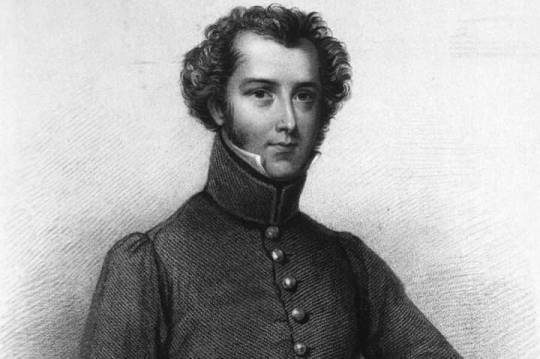
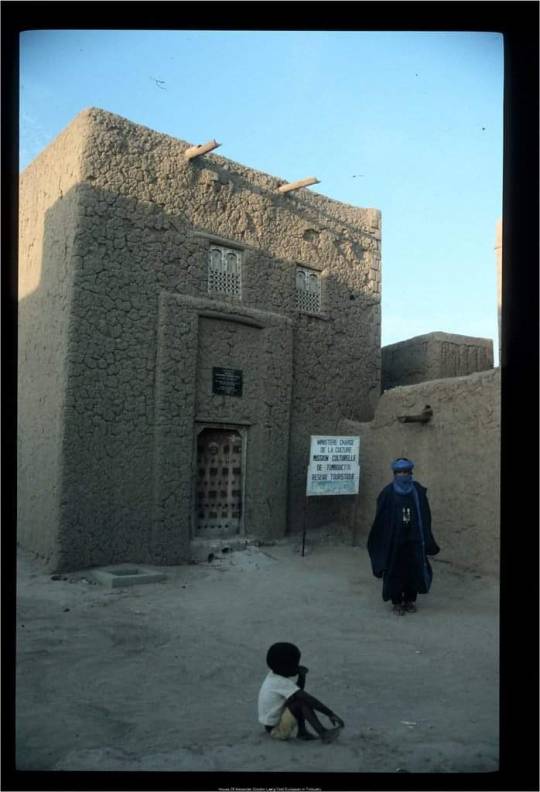
11 notes
·
View notes
Text
Telek Dagger of the Tuareg Nomads of the Sahel Desert
The Telek dagger holds a significant place in the rich and intricate cultural tapestry of the Tuareg nomads of the Sahel desert. With a straight, long blade and a solid copper pommel in the shape of a cross, this traditional weapon embodies both practical functionality and profound symbolism.
Despite the predominantly Muslim faith of the Tuareg people, the retention of the cross-shaped grip on…
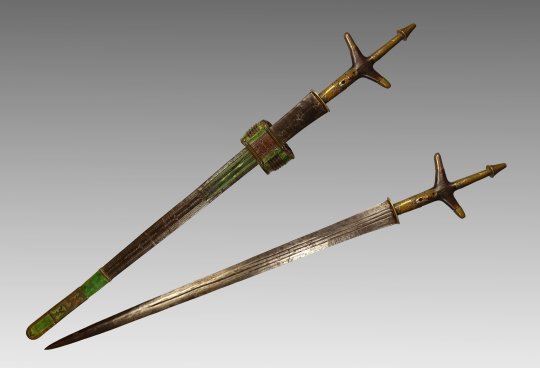
View On WordPress
#African History#African weapons#North African weapons#Telek Dagger#Tuareg#Tuareg History#Tuareg weapon
2 notes
·
View notes
Text
WIP - Where Will You Go to Die
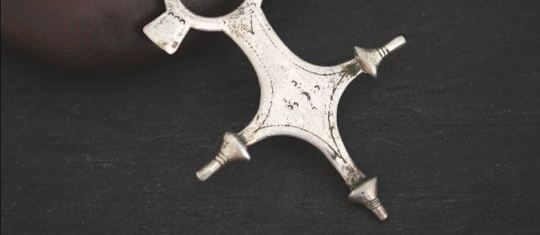
Snippet from a one shot that finally got a title.
No ship but unrequited feelings, Female Asexual Nomad V, character study.
No proofreading, we die like men.
*
They told her she was born with a map in her lap, that it was a blood thing. Ivy never put much credit into that blabber, her talent, if she has any, is the fruit of her hard work, and her work alone. All that they never saw, the nights she spent perched on every old, half-decaying paper map and blueprint she could put a hand on, overlaying the old and the new on canvas she only could understand as her lamp burned long after those of the whole camp went dark. The puzzles of the southwestern wastelands always growing piece by piece, what she couldn’t find a guide or information about, those black holes in the plans, she mounted her ride and went to explore, often alone on her Brennan Appolo, only a pistol as a shield, a box of amo and a flask of hot tea. The Bakkers seniors gave up on reasoning with her after a while, she never gave them a sufficient reason to chase her out of the clan anyway, as long as she provided. That, and they were a superstitious bunch.
“Daughter, I give you the four directions of the world, for no one knows where you’ll go to die”* ( Those, as told in Tuareg legends, are the words fathers say to their sons when they reache the age of nomadism, tweaked here for plot purposes ;))
They were her mother’s last words as she passed her on the only piece of jewelry she ever wore, an “odd” cross Ivy kept around her neck since then. Mother, whose words were rare and disjointed held her eyes with such an intense stare Ivy had to look away, the grasp on her chin afterward wasn’t tender, forcing her back into bottomless, hard eyes, and she saw a prayer there, not a supplication, but an order, to survive. Then like that, she was gone.
Mother was a nomad too. Her parents before her, nomads. No, they’ve never been fallen corpo slaves, never blackballed from homes and offices or forced to leave their farms. They've never known anything but the endless desert, a Sahara only ruled by the four winds. They were survivors of the few tribes that resisted machine civilization alone until the African desert was by decree of the last corpowar victorious allies annexed and divided and cleared out of its people. They’d sent drones and bots to locate the clans and flatlined everyone, purchasing the runaways as they fled. There was no use to keep the locals alive, without civil status and affiliation, it was easier to clean out the map of an entire population without thinking too much about accountability. Using the nomads as working power was costly, who would invest in a bunch of illiterates? Everything is justifiable in the name of progress, even genocide.
Mother, the original nomad was buried with the secrets of her life. While she lived clad in obstinate mutism, the only legacy she left for her sole child was an amulet and a pile of maps and notes, encoded bequest Ivy devoted her days and nights to interrogate.
By the fifth anniversary of her mother’s death, Ivy could pride herself with a mini atlas of the badlands under her arms, the unaccomplished fruit of her work that she never conceded to put in a shard. It wasn’t just a mapping of the area, that was something available and common when one knew where to look, it didn’t lay out the roads, freeways, small encampments, towns, and gas stations, it was a nomad guide, or at least an attempt to it, outlining the blind spots, the possible escape routes and shortcuts, drawing up the natural hideouts and the frequency of sandstorms, contained notes on the fauna and useful flora, anything Ivy could put there, everything she knew, the grey matter of her brain. For Ivy, possessing a digital copy was out of the question, handing it to some Raffen Shiv as they fry her head, never an option. The clan put up with her eccentricities, for a while.
The habit was that gambling lovers started their bets as soon as they saw Ivy gas up.
She’ll return, return she will not.
Smartass Quinn used to pluck the spikes of old cactus leaves, one after another, dramatic every time she prepped for one of her exploratory runs. Quinn liked her, she liked Quinn too, yet the day she pushed them gently away when their hands ventured too far up under her shirt, she didn’t see kindness in their eyes, just a hurt ego, unable to understand how one could claim feelings and never “act on them”. Ever since she hadn’t had much luck with the others, responses varied, she rarely saw acceptance. By the time she finally came to terms with who she was, the Bakkers woke up to the disappearance of their fourth leader.
Chari fucking Dahling was the real start of the end. A family deserted by its own leader, a spectacular way to set an example. After she came drunks and characterless cowards, family supplies dwindled as agreements and contracts with the other clans were broken on whims. A year before the final decision to join Snake Nation put the execution rope around the family’s neck, Ivy’s skin resembled more her maps than human flesh, cuts and scars attesting to the dead-end they were all heading to with the furious joy of mad men.
She opposed but never left when she could. It was her biggest mistake, too late to talk, too late to leave, waiting too long, living on the outskirts of the family. She should have listened to Ossian as he packed years ago. On that last night, her screams went through hanged men’s deaf ears. The longest night of her life. A gun barrel stayed pointed at her head as she threw into the flames the sole copy of her efforts, but the dead hand that held the gun never dared to shout.
“ You come back, you’re dead meat” were Orhan's ironic last shaky words the wind carried to her as she kicked off.
… For no one knows where you’ll go to die.
9 notes
·
View notes
Text
Sci Fi Saga 2

In the distant future, where technology and mystery intertwined seamlessly, a lone agent named Tuaren found himself on the brink of a mission which would challenge both his skills and his beliefs. In a world where new dimensions and alternate realities were not just the stuff of science fiction, but a reality, he was tasked with a mission holding the promise of unparalleled riches and wealth rise, but also carried the weight of uncertainty.
The mission dossier lay on the table, illuminated by the soft hum of holographic lights. Tuaren's gaze was unwavering as he studied the contents of the file. He was to identify a heavily guarded door, a portal of sorts leading to another realm, an enigmatic place which had been sealed shut for years. Due luck of the choosens, hardly ever anyone accomplished all the tasks needed for such door to be open.
The door was unlike anything he had encountered before, adorned with complex patterns seemed to shift and dance as if alive. It was protected by an intricate alarm system, even the most skilled doers had failed to breach. But Tuareg was no ordinary agent – he was chosen for his exceptional abilities and sharp intellect, to identify the door, and to report to authorities if it still guarded.
As he stood before the door, his heart racing with a mixture of anticipation and trepidation, he spotted her. She was standing there, right in front of the door, her presence almost ethereal. A robot awaiting for next chosen to be taken through.
Without a word, she motioned for him to approach. The alarm system, though still active, seemed to falter in her presence, as if recognizing her authority. Tuaren cautiously stepped forward, his senses on high alert. As he reached the door, he felt a strange energy emanating from it, like a current of possibilities tingling at his fingertips.
"The door to the realm," she began, her voice carrying a mixture of caution and longing. "It opens only for those who are chosen. Those who pass through it are rewarded beyond measure – wealth, knowledge, and a place of honor beyond imagination. But once you enter, there is no returning to your old life. The path ahead is unknown, and the journey irreversible."
Tuaren looked at her, his mind swirling with questions. Why was he chosen for this mission? What lay beyond the door? Was the promise of riches worth the uncertainty of the unknown? As he pondered these thoughts, he felt a resonance within himself, a curiosity burned brighter than his apprehension.
With a determined nod, he turned back to the door. It responded to his proximity, its patterns rearranging themselves as if in acknowledgment. He took a deep breath, his heart pounding in his chest, and reached out to the door's surface.
The door opened, its motion accompanied by a soft, melodious hum which seemed to echo through time and space. As Tuaren stepped through, the world around him transformed. Colors shifted, shapes morphed, and he found himself in a realm unlike any he had ever imagined. The air was charged with an energy pulsing through his veins, and he realized he had embarked on a journey which would forever alter the course of his destiny.
In the distance, he saw figures who had left his old path, their faces illuminated by a radiant glow were vanishing, evaporating into the mist. They welcomed him with smiles to hold the wisdom of those who had embraced the unknown and reaped its rewards. As the door closed behind him, Tuaren felt a mix of exhilaration and apprehension, for he had crossed a threshold into a future to be held both challenges and wonders beyond imagination.
And so, in a sci-fi future where realms awaited to be explored, and the choices made could reshape lives, Tuaren embarked on a journey of discovery, his heart filled with the promise of a destiny was uniquely his own.
#SciFiSaga#RealmOfEnigma#FuturisticAdventure#AgentsOfMystery#BeyondTheThreshold#RobotGuardian#DigitalCollaboration#UnravelingSecrets#ExplorationUnbound#WorldsWithinWorlds#SurrealRealms#CodeAndIntuition#JourneyIntoTheUnknown#BoundariesOfReality#TranscendingTime#InfinitePossibilities#FutureMysteries#GuardiansOfTheGate#SynchronizedDiscovery#SurrealSciFi#TechAndImagination
0 notes
Text
Traditional Jewelry
Buy traditional jewelry and traditional jewelry sets in different designs at Mount Meru Holistic. We provide latest trending designs jewelry at unbelievable prices. Tuareg Agadez cross, charm necklace, hand-made necklace, silver/nickel mix with black onyx beads. For more details email: [email protected]
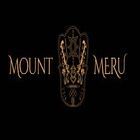
0 notes
Video
The Last Desert Gate - The Lost Djinn Kingdom by Daniel Arrhakis (2023)
With the music : Bivouac · ARIDEL
youtu.be/RKpDU90p9QU?list=OLAK5uy_l1sFAE2QPdJFpoiRhqxYlh_...
The Last Desert Gate - The Lost Djinn Kingdom
In South-western Libya (Fezzan) there is a holy mountain for the Berber Tuareg people, "Djebel Idinen" or the "Mountain of Ghosts".
The haunted natural rock fortress of Idinen, also known as the legendary Fortress of Ghosts, or the Cave of the Jinn, is located in the southern region of Libya, about 25 km north of Ghat.
It is bordered by Wadi Tanezuft along the east and the Algerian border from the west. The Idinen summit is about 1280 metres high, and is an offshoot of the mountain nearby. The trail from the Algerian border-side, from Meggedet to Ghat, allows an excellent view of this strange mountain.
In fact Meggedet itself is also the home of some bizarre rock formations, of massive sculptures of "devilish" figures that can be easily associated with this mountain.
But this story that I am going to tell you is much more than a legend, it is an extraordinary adventure lived by an explorer Hugh Clapperton, who crossed the haunted mountain in Libya and whose writings and drawings were later found in his leather bag when he died and kept secret to this day...
Story and image by Daniel Arrhakis
__________________________________________________
"The Lost Djinn Kingdom" Is a creative fantasy alien desert mystery series based in the Berber Tuareg mythology and Moorish Stories.
Images created by Daniel Arrhakis
(via The Last Desert Gate - The Lost Djinn Kingdom | The Last Des… | Flickr)
0 notes
Text
Morning writing
Getting a few words down before work. Chapter isn’t done but it’s getting there finally….
From: Death, Rebirth and the Jackal, Chapter VII: Reyes POV, tentatively titled At Odds
Fandom: Mass Effect Andromeda, The Mummy 1999
Pairing: Eventual MReyder
Tags/warnings: first draft, flashback, Zia should be a warning right??
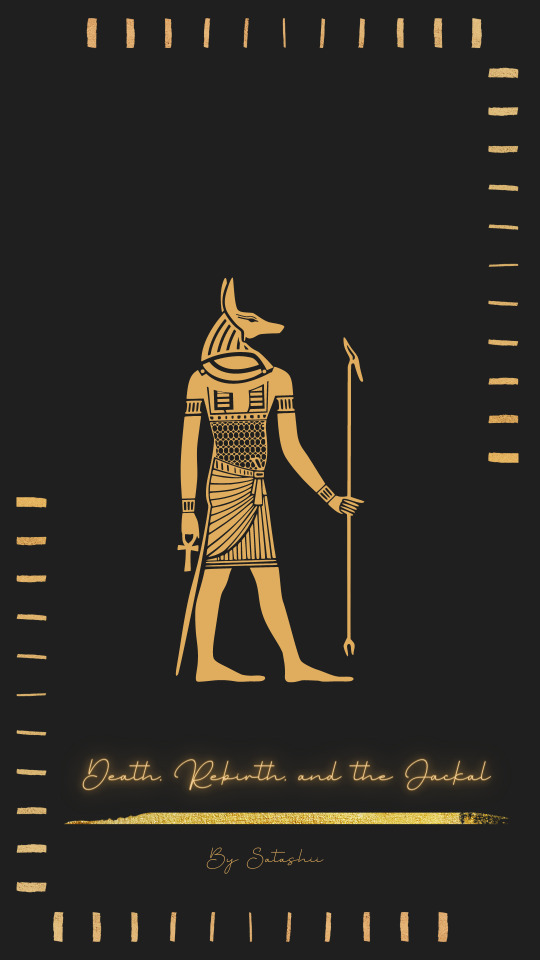
A few years ago… in Hamunaptra
Reyes ordered his soldiers to hold steady, and miraculously they did. His men hadn't slept in days because of whatever malicious and hungry spirit slept beneath their feet, and they'd run out of water hours ago. So parched and on edge, they now faced a Tuareg army that had them hemmed in on all sides and pinned them with the cursed city at their backs. If they stayed—they died of dehydration. If they fought… well, a few of them might get through.
He had no delusions about the odds of survival, but he had to try. They were his men, his legionnaires.
Zia, one of the few female soldiers in the legion, crouched next to him. When she'd joined his unit, he'd pegged her immediately as a woman hiding as a man and confronted her privately. She had told him to go fuck himself, she was a soldier of fortune, and he'd respected that which had surprised her. He'd later found out that she'd been robbing churches and synagogues, and the authorities had sentenced her to join the legion, which she'd then enjoyed enough to stay as long as the pickings were rich enough. His learning of her secrets had led to an odd sort of trust, and they'd even had a relationship of sorts up to the point when the map had been found that led them across these cursed sands to the fabled City of Treasure.
His men—and especially Zia with her sticky fingers—had not listened to his cautions and insisted upon following the map. Reyes had known with each step that there was something in this city that made the pull within him worse.
Hamunaptra called him like a siren luring the sailors to their deaths upon the rocks. It sang a sweet, taunting melody in his sleep, telling him he belonged here. It was his home, and the man of his dreams visited him every night, even when he lay with Zia, telling him to come home until he could not stand her touch.
Home. Ha.
Hamunaptra was a death trap for his men.
They'd lost two men the first night—one to a drunken fall off a cliff, but the other had disappeared into the half-covered buildings and was never found again, but the howls of the jackals said something had died that night.
Oh, and the jackals. The jackals watched him from the shadows, their tongues lolling out of their mouths, occasionally letting out an excited howl or yip and eyes bright with intelligence that he'd never seen in another canine and tails wagging. They never approached if he was with Zia or anyone else, but he'd dared walk alone two nights ago, and an entire pack had come out to meet him like a pack of hounds to their master. Eager noses pushing forward for a stroke or pet, nipping at each other to make room to get closer to him. Their fur had been soft under his hands, and if he had not returned to camp, he knew they would have curled around him protectively while he slept and kept guard.
They were wild wolves but as tame as a pampered lapdog in his hands.
Reyes shook his head to clear it. His thirst was beginning to make him hallucinate in the punishing heat. He was still sweating, but it wouldn't be long before he'd have none to give, and heatstroke took over.
The Tuaregs were mounted in a line and advancing. Their horses spurred into a gallop as they charged. "Steady!" He yelled. They had the advantage of modern weapons, but if they shot too soon….
Zia, sighting down her rifle, muttered to him, "Why can't we just surrender again?" But he ignores her grumbling. Surrendering would mean all of them would be slaughtered. They'd violated Tuareg territory and been followed east as they crossed the desert. It had been foolish to think that the city would protect them. The city that whispered and claimed him was no place for his men or the living.
"Wait for it!" He ordered, waiting until they were only a hundred paces out when the ground rose slightly. If the horses stumbled and the front fell, those behind would be upon them and unable to avoid the mess, allowing for a second volley.
The charge was within his targeted range. "Now!" Reyes commanded and shot his rifle, taking out a robed man directly in front of him before the recoil of his rifle had finished. He cleared the cartridge with a quick, practiced snap and reloaded as his men did the same. The Tuareg front line had thinned, and there had been some secondary stumbling, but they were still thundering down upon them with shrill screams of ooo-ooh-Ohloong that were terrifying in the deafening noise, the sun glinting off scimitars raised to strike like steel bolts of lightning.
They manage to get off a second volley, but then the charge is upon them, like a tsunami with sharp edges crashing into them. The noise is terrible, guns going off, screams of horses and men dying, war cries, and underneath it, the sound of dead bodies hitting the sand with soft whumps and the dying gasp for air as hooves trample those caught beneath. Reyes is in the middle of the fray, shooting until he is out of ammunition, and then he uses his rifle as a club until it is cut to pieces by the slash of a sword.
The strategic line they'd been holding is gone. Around him is chaos, and his men are being cut to pieces by the enraged Tuaregs. Cries of 'die trespasser' echo with other epithets and stranger curses. Zia is gone. She ran after the first volley, her first instinct always to protect herself and others be damned.
Drawing his pistol, he shoots and runs for higher ground. There's no one to save now, and his men that are not running are either dying or dead. The sands are slick with blood and other body fluids, making him slip as he fights his way free. He takes a shot to the right shoulder but keeps going.
He does an inelegant dance with a Tuareg that ends with a sword through his abdomen, but he knows from experience that it won't stop him, so he grips the blade's hilt so it can't be pulled out. The Tuareg man doesn't know what to do and yanks ineffectually to free his sword, while Reyes takes the knife from his boot and stabs him in the eye, killing the Tuareg instantly.
As the dead man sags to the ground, Reyes yanks the sword free and screams at the pain. Holding one hand over the gushing wound, he stumbles to the closest sand-buried building and hides in the shadows, sword clutched in his other fist. He can feel his flesh knitting back together, his cursed gift working faster here than anywhere else.
The battle is over quickly. The carnage spread out in front of the city like an offering. The Tuaregs are efficient, swords slashing down to make sure each legionnaire is dead methodically before mounting their horses and withdrawing. They have no interest in entering the city, which verifies Reyes' suspicion that they are wary of whatever stirs beneath his feet. He can feel its hunger and knows it is waiting for the sunset to claim the bodies left to it.
By tomorrow, there will be few traces of the battle remaining. The sacrifice consumed.
He sees his chance just as the sun begins to set, and he stumbles out of his hiding place. Reyes cannot stay here, the rumbling excitement beneath his feet itches at his brain like a conversation heard at a distance in a language he doesn't quite remember, and it scares him that he will lose his sanity if he remains.
One stumbling step becomes two and then three, his legs firming up as he gains strength. The first wind of the night hits his nostrils, and there's a cleanness to it that belies the carnage around him. The howl of a jackal announces that they are beginning their hunt, and he gains speed, running.
Above him on the ridge, he notices a pair of Tuaregs on horseback. They are watching him but make no attempt to stop him, so he keeps going into the safety of the desert with a pack of jackals on his heels, their calls asking for him to join them in their hunt.
#death rebirth and the jackal#mreyder#first draft#making some headway#mass effect/the mummy AU#reyes vidal
0 notes
Link
Check out this listing I just added to my Poshmark closet: Sterling Silver Tuareg Cross Pendant On Cord Unisex Tribal Amulet.
0 notes
Text
Product
Africa | A silver cross pendant ~ ‘croix de Tahoua’ ~ from the Tuareg people of Niger
AGE: 1990
MATÉRIEL: testé positif comme argent à haute teneur.
TAILLE:48 CM collier 7 CM pendent
The touareg family of Niger has been making jewelry for more than 25 generations.
They are famous for their high quality hand crafted jewelry – using 99.99% pure fine silver,
ebony and semi precious stones. The…
View On WordPress
0 notes
Photo
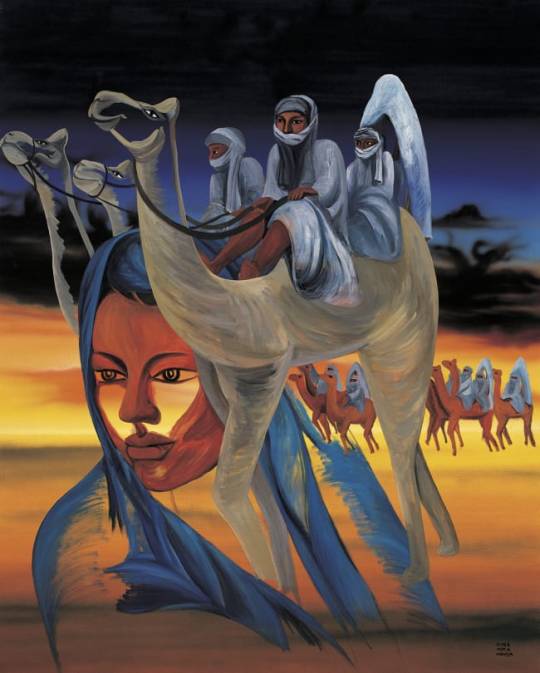
Jung Kangja (Korean,1942-2017)
The Tuareg Tribe Crossing A Desert, 1989
Oil on canvas
102 notes
·
View notes
Photo
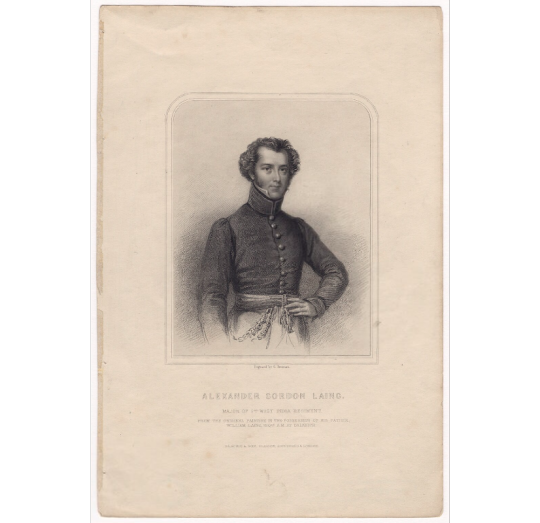
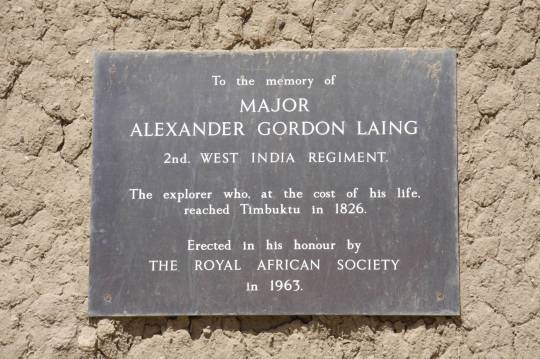
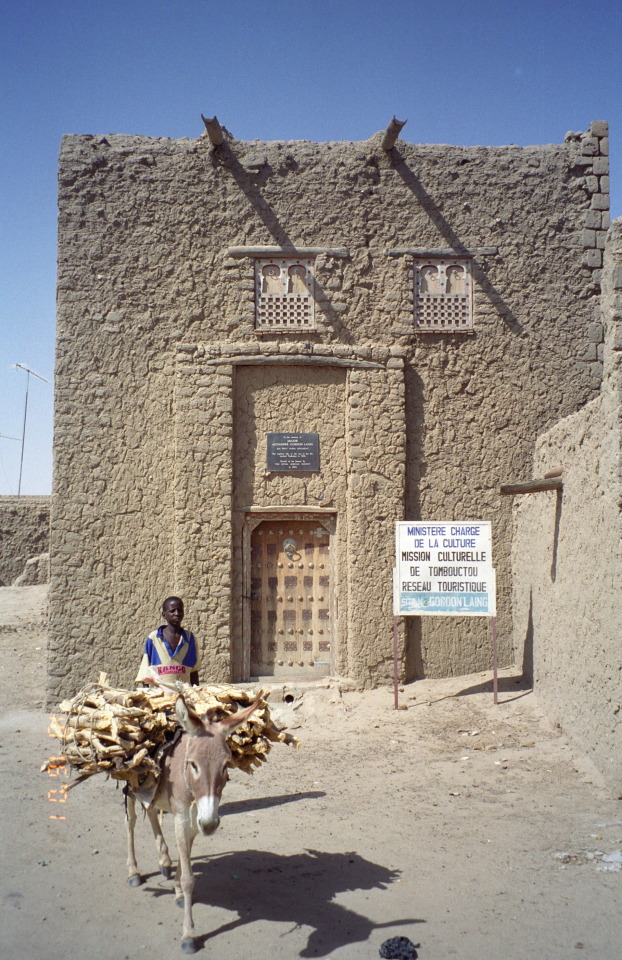
The explorer Alexander Gordon Laing was murdered on September 26th 1826 in Timbuktu.
While some Scottish explorers’ exploits are engraved on the national psyche, such as David Livingstone and Mungo Park, others like Alexander Gordon Laing have long since slipped into near obscurity. Yet he achieved that most coveted of prizes, Laing managed from here to Timbuktu located in the West African nation of Mali on the southern edge of Sahara Desert.
Gordon Laing, as he became known, was the son of school professor William Laing who initially educated his son personally. Alexander joined the military and rose through ranks, being part of York Light Infantry Volunteers since 1811, 2nd West India Regiment since 1815 and Royal African Colonial Corps since 1822 seeing much of Africa while in the army.
As well as the military campaigns Laing had an interest in geography, managing to find and map the source of river Rokel and relatively precisely ascertain the source of river Niger. In 1825 he managed to secure the permission for finding the source of river Niger and finding the route to the city of Timbuktu. His journey came with the blessing of the Famous explorers Joseph Banks, and Henry, 3rd Earl Bathurst who then commanded colonies in Africa.
Laing was instructed to explore the hydrography of the Niger basin. His journey began on 16 July 1825, two days after he married Emma Warrington, daughter of the British consul in Tripoli. He travelled across the Sahara, reached the settlements of Ghadames and In Salah. During the last leg of the journey across desert of Tanezrouft his party became attacked by the group of Tuareg raiders, during which he wrote that he received over 20 wounds. In the end, he managed to reach city of Timbuktu on August 18 1826, barely alive and with only one hand. He thus became the first European to cross the Sahara from north to south. Laing wrote another letter on 21st September, which eventually reached Tripoli. This reported his position in the city as being very difficult, and noted his intention to leave three days later. It was later established that he had done so, and that he was murdered in the desert on the night of 26th September 1826.
The pics are of Laing, and the house he stayed at in Timbuktu, now a tourist spot.
I’ve no sympathy for the likes of Gordon Laing, unlike other Scots explorers like Livingstone and Mungo Park, Laing was in the military and part of the British Empire that enslaved so many, no doubt his rapid rise through the ranks of the British Army was paralleled with putting down slave revolts uprisings and conflicts like the Anglo-Ashanti Wars. This post is not a celebration of his life just some historical points.
23 notes
·
View notes
Photo
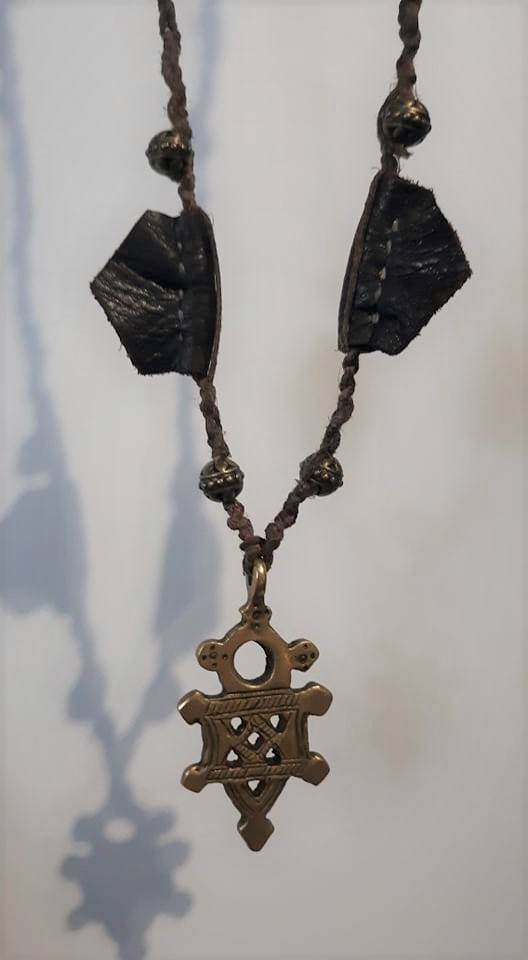
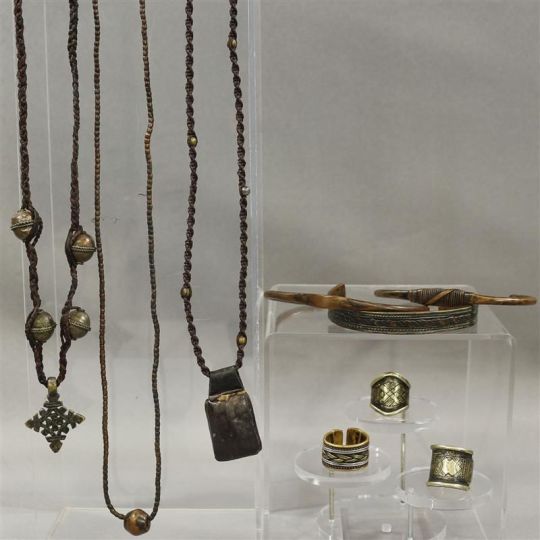
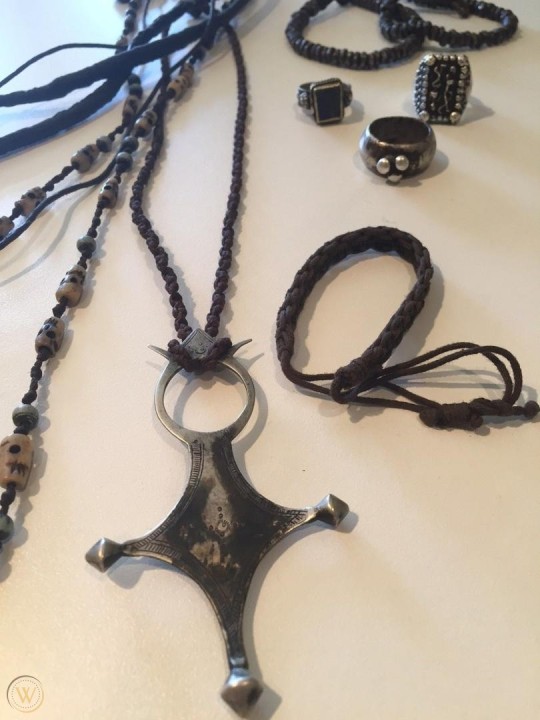
I completed my Black Sails-inspired necklace! The necklace features a brass “Tuareg Cross,” brass beads, and leather tabs along hemp cording that I braided. Pictured as well are some of the screen worn jewelry from Black Sails I drew inspiration from, and notably one piece (worn by Israel Hands in the show) is that of a larger silver Tuareg Cross.
This is a piece of jewelry that would have originated from along the Guinea Coast in Africa near what used to be Whydah; the so called “Slave Coast,” which is where much interaction during the Atlantic Slave Trade took place. An item such as this could have reasonably been acquired while visiting the Guinea Coast, or, could have made it’s way to the West Indies. Tribal jewelry like this was also featured among the maroons in Season 3, and worn by many of the pirates of Nassau in the series.
The Tuareg Cross has been in existence for over 1,000 years, and is an amulet often worn for good luck, with superstitious beliefs that it protects the wearer from the “evil eye,” demons, negative energy, and evil in general. The symbol also represents sexual unity, with the tips extending representing males, and the circular opening at the top representing females. The symbol is at times mistakenly referred to as the “Muslim cross,” but the symbol has no bearing on either Islamic nor Christian beliefs. There are a number of variations of Tuareg crosses, 21 in total, with this one in particular being the “Karaga” one, named for Karaga in current-day Ghana. Typically, the crosses are made of silver (like the one worn by Israel Hands), but other metals have been used, except for gold; which was considered by the Tuareg people to be a demonic metal.
#Costume#Outfit#Black Sails#Screen Used#Replica#Jewelry#Tribal Jewelry#Ghana#Guinea Coast#Nigeria#Pirate#Pirates#Tuareg
13 notes
·
View notes
